Survival in the face of inadequacy.
Thank you @terganftp for coming up with this topic. It is very timely for me as a Nigerian.
With respect to your entry, I don't have information about farming in Venezuela. How is agriculture in that country? I am asking this question because that is the saving grace for Nigerians. If not, the report of 133 millions out of 200 million population living below the poverty line would have been a child's play.
I personally doubt the data that gave rise to this conclusion because if I look around, I don't see 67 million living above the poverty line in this country.
Surviving in Nigeria in recent past.
Surviving in Nigeria is very difficult. The country's resources are in the hands of very few.
Sanusi Lamido, former Central Bank of Nigeria Governor once claimed that the bulk of the country's resources is in the hands of about 10000 Nigerians. He made this claim when the population was estimated to be 160 million. The competition by the vast majority of Nigerians for the leftover of the elites can best be imagined.
This is largely responsible for what I would term the very low living standard in Nigeria. Nigeria is made up of 36 federating States which are grouped into six geopolitical zones. Each zone has an average of 6 States and these states share some similarities in culture and what constitutes the economy of the people.
Out of these six geopolitical zones, I have visited five and I can conclude that the characteristic shared by all is the low living standard of the people.
I was born and raised in the Southwest geopolitical zone. The zone prides itself as the most educated in Nigeria. The level of education in the zone makes the rate of poverty relatively lowest. By poverty here, I am restricting myself to the access to proper feeding by the people. Majority of the people in this zone are into Agriculture. They grow tuber crops and some other vegetables.
When I was growing up, you hardly see a family in the southwest eating just carbohydrates without balancing it with protein and vitamins. People see it as an act of disrespect if they are served food without meat or fish. Life was fairly better those days.
When I left Southwest to North Central, I met a pitiable situation. Majority eat twice a day and a family of five might just be able to afford a fish for their soup. When the food is ready, the fish is shared among the five people. You may get to a household where this becomes a luxury. Many homes eat carbohydrates for days without any reasonable addition of other classes of food.
I later moved to Northeast where I participated in the compulsory one year National service. While in the zone, I saw another dimension of poverty. Some families see eating a balanced diet as a waste of money. If what you harvest from your farm is yam and corn, you should continue eating it for as long as the stock lasts.
I later spent some days in the Southeast and the situation was worse than the Southwest but better than the North. They aren't exempted from multidimensional poverty.
These experiences of mine around the country were when Nigeria was safer. Safety on your farm was guaranteed those days.
Surviving in Nigeria of today
If what I explained above can be awarded a score of 3 on the scale of 10 in terms of proper feeding of the people, the present situation should have a score of at most 1 or 0 or even negative.
Farmers that had access to their lands to farm before are no longer permitted to farm due to incessant attacks by bandits. They were eating carbohydrates before and it was seen as inadequate but they have access to nothing presently. This is the predicament of the majority of village dwellers in the North. This has advanced the rate of criminal activities.
Subsidy removal and Naira floating
No hope for the people and the government is appearing helpless. What has compounded the bad situation of the people lately is the removal of subsidy on Petroleum Motor Spirit (petrol) and floating of Naira on the import and export window.
Subsidy on Petroleum Motor Spirit is one of the potent ways that succor had been rendered to the people over the years. The effect gets to the common man in the village, no matter how remote his village is.
Successive administrations had claimed that the subsidy regime on petrol was a complexity of corrupt practices. According to the government, two major factors were responsible for the removal of the subsidy.
Marketers imported more volume of petrols more than the actual needs of the country. Some marketers would claim subsidies for non-existent vessels of petrol.
The second reason is that subsidized petrol was being smuggled out to neighboring countries by some unpatriotic Nigerians to make more money.
Having an official exchange rate by the government has also helped in stabilizing the importation dependent economy like ours. It made imported goods more affordable because the exchange rate of Naira to dollar dictates a lot about the price of the goods in the Nigerian market. When the Naira is strong against the dollar, affordability of imported products becomes easier but when the Naira is weak, the price skyrocket.
Until the last few months, the official exchange rate of Naira to a Dollar was less than 500 Naira. During this period, there were accusations of some government officials hoarding the Dollar and selling it to some groups of people that would resell it at the parallel market while some kickbacks went to the official.
The current government, in an attempt to curb such corrupt activities, floated the Naira for its value to be determined by market forces. This saw the exchange rate of Naira to a Dollar jump to about 800 Naira.
When the effects of the floating of Naira and subsidy removal hit the prices of foodstuffs in the market, more of the population was subjected to hunger.
Minimum wage against expenditure
The minimum wage in Nigeria is currently 35HBD monthly. This can hardly sustain an individual in Nigeria in a month.
Unfortunately, we have a family of three or four living on this.
Someone living on this budget can't eat what he wants but what he can access. Going by this, eating a balanced diet is out of the options.
The minimum wage quoted is for federal government workers. Some states pay their workers in percentages, with the complaint that there is no money in the government's coffer. I have seen a state government worker in Nigeria paid 7HBD salary in a month. This was a family man.
Few days ago, I bought three of these yams for 2.9HBD.
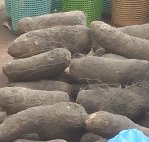
My family of three will only eat this thrice - one tuber per time. If my earning were to be 7 HBD, how on earth would I be able to afford just carbohydrates in a month, talk more of taking proteins and vitamins.
In a case of struggling to survive like this, talking of proper feeding becomes secondary. Your interest is to avoid starvation. A 5kg of rice is about 5.8HBD and this can't feed two people for two weeks (of course, they are not expected to be eating rice all the time). We then talk of oil, seasonings and other basic requirements to make it edible.
A kilogram of goat meat (chevon) is 3.5 HBD.
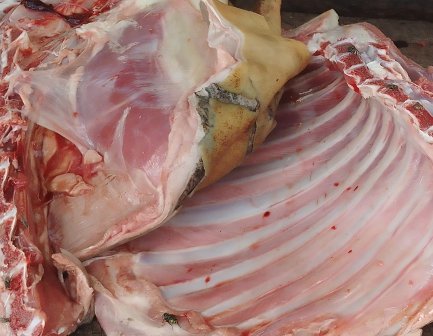
This becomes a luxury for low income earners. Many don't even go there. Some people would make do with just okra or any other vegetable.
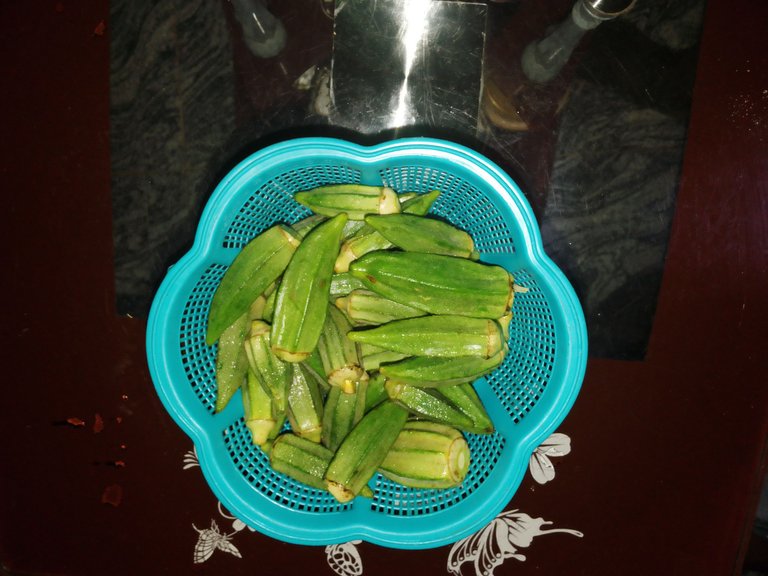
I bought the above okra for 0.11 HBD.
Check out the Irish potato below that cost 3 HBD per basket.
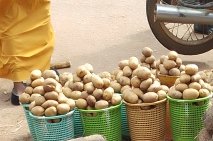
Since the current increase in inflation, it has affected my purchasing power. As a result, I draw my scales of preference carefully. I consider the quantity of carbohydrates that would serve my family for a month. Whatever remains is what will serve us in balancing our diet throughout the month. Many of what is supposed to be part of the basic requirements for proper feeding become optional.
Government interventions
Over the years, the government has come up with many intervention programmes to ameliorate the suffering of the people but majority, if not all, of such interventions are not designed or implemented properly.
There was a time the Vice President of Nigeria spearheaded the distribution of 11.6 HBD to market women each to boost their businesses. This was done randomly in the market without any record of the recipient. Of course, billions of Naira went for it and finding a beneficiary is like looking for a black ball in a dark room.
The latest one was the president giving directives for 5,793,742 HBD to be given to each State of the federation to purchase rice and grains to be shared among the populace. The least populated State in Nigeria is estimated to be more than 3 million - Lagos and Kano States have more than 20 million population each - and at least, more than 60% of the population are in need of such interventions.
If 2 million are to benefit from such interventions, then each person would get grain worth 3 HBD. This is a one off arrangement. The question is what 3 HBD worth of grain can do for someone in a week, a month or whatever time frame under consideration by the government.
NGO's intervention
Some NGOs do intervene but corruption in Nigeria has eaten deep into the fabric of our national existence.
An orphanage was exposed recently on how the staff corner scholarships slots from NGOs meant for the orphans for their children.
Many NGO interventions ended up in the pockets of those not in the category of people in need of it.
Survival by any possible mean
In order to survive, many resulted in begging. Some result in self help by forcing their ways in hijacking the properties of others to quench their hunger.
An incident happened in my compound recently when some thieves jumped over the fence to steal a motorcycle. They would go and sell it at ridiculous prices. The rate of such thefts has increased lately due to the hardship.
Of course, we have those that frugally manage what they have even if it means skipping meals or eating unbalanced diet.
Conclusion
In conclusion, the situation in Nigeria is getting close to the kind that demands emergency declaration.
If the situation should get out of hand, the whole of Africa may be in trouble because crises in a country with one fifth of the entire regional population poses danger to the other 53 continental neighbors.
There is hunger in the land and each person is left to his or her fate. I hope the government acts fast to salvage the situation.
All the pictures are mine unless otherwise stated.

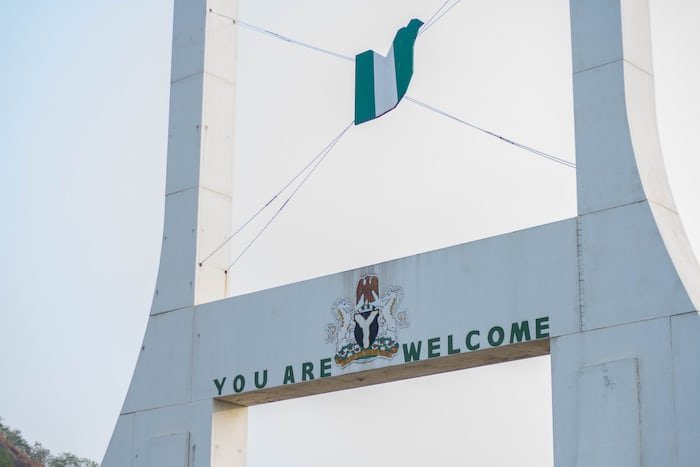
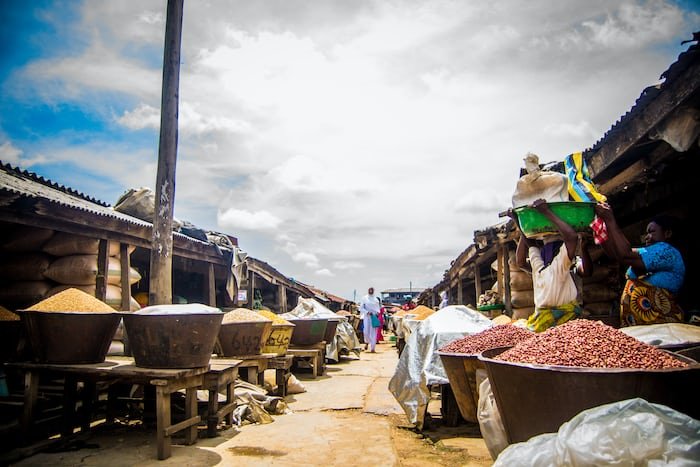
Thank you for giving this explicit situational report and analysis. Truly the populace are suffering and the government seems to have little or no clue as to the way forward.
The interventions by government are only by paper and would not solve the terrible state the people are in.
NGOs now know better than to channel resources through the government
The kind of suffering in Nigeria now is beyond comprehension. You need to visit villages and see the magnitude of the suffering of the people. People are barely surviving.
The government is not serious about the plight of the people. Subsidy is too important for our economy for it to be removed without putting measures in place to mitigate against the negative effects. They are busy taking care of themselves while the people suffer.
God will intervene. It's wise to arm ourselves against government and harsh economy. Unfortunately for those in the rural areas, it's a long call
View more